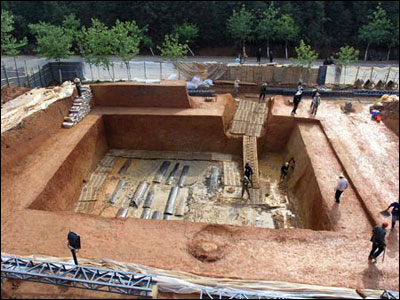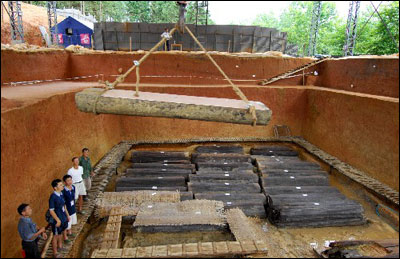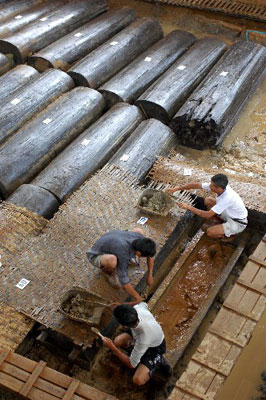| Tools: Save | Print | E-mail | Most Read |
| Ancient Tomb Contains Rare Skeletons |
| Adjust font size: |
Chinese archaeologists have started to excavate a 2,500-year-old tomb, containing 47 coffins made of a rare wood called nanmu, in east China's Jiangxi Province.
The tomb, in Lijia village, Jing'an County, is 16 meters long, about 11.5 meters wide and three meters deep. It is believed to date back to the Eastern Zhou Dynasty (770-221 B.C.). This is the largest group of coffins ever discovered in a single tomb, leading cultural experts and media to dub the excavation, "the most important archaeology project of the year." Archeologists earlier opened nine coffins because they were rotten and partially destroyed by tomb robbers. Archaeologists opened another coffin on Sunday morning, finding a relatively complete human skeleton, bodily tissue, as well as many bronze, gold, and silk items, porcelain, and jade. The bodily tissue has been identified as the brain of the deceased. The tissue has shrunk to the size of a fist, but it has a complete brain structure with two cerebral hemispheres, cerebellum, and brainstem. "This is the first time that such a complete structure was found in southern China and it will fill in gaps in the study of human bone structure in the pre-Qin era (770-221 BC)," said Zhu Hong, a paleoanthropological expert from Jilin University. Zhu said the unique burial style could explain why the skeleton and the brain tissue were preserved so well in an area where the soil is acidic and unfavorable for preservation of the human body. The coffins were made from halved nanmu, a rare and extremely durable wood, bound with rope, and covered in a layer of white mud called loess. The layer of loess was then burned, making the tomb pressurized and waterproof. "The coffins were tightly sealed and there was little oxygen in there for bacteria to reproduce," said Zhu. The coffins, 2.5 to 2.8 meters long and 0.5 meters wide, were laid out side by side in an orderly fashion. They are being transported to a nearby storehouse to be kept in a temperature and humidity controlled environment. Archaeologists have taken 13 coffins to the storehouse and opened 11 of them. They are to open more coffins in the next few days and expect to find more skeletons. The main coffin, weighing about two tons, will be opened on site at about 9 a.m. Monday, as it is too big to move. A group of cultural, paleoanthropological, geological, forestry, and archeological experts across China have arrived at the site for a joint research project. Experts will pinpoint the gender and ages at the time of death, and will further identify the causes of their deaths, their identities, their burial dates, and why they were buried together, said Fan Changsheng, director of the Jiangxi Provincial Institute of Archeology. The discovery could provide valuable clues to the study of social customs, funeral rites, and lifestyles in the area, experts said.
(Xinnhua News Agency July 2, 2007) |
| Tools: Save | Print | E-mail | Most Read |
 |
| Related Stories |






